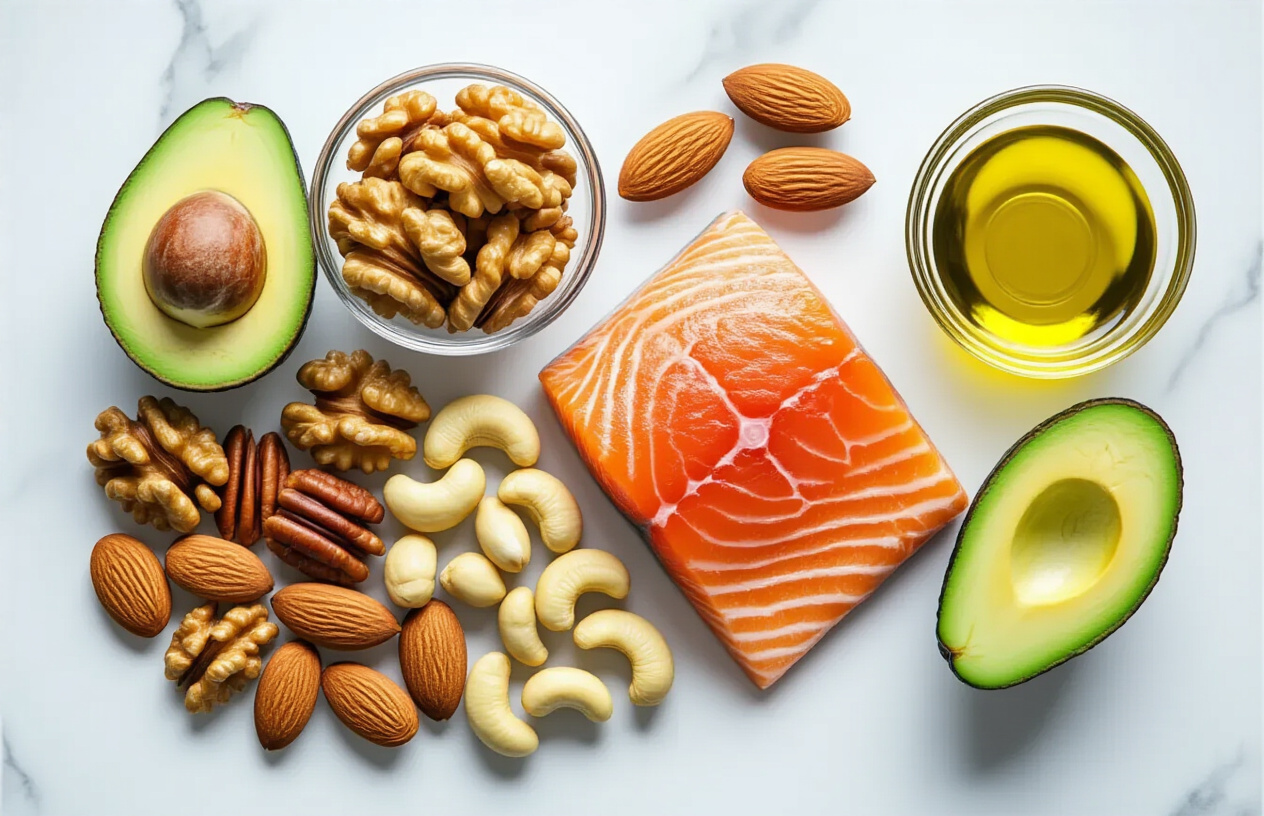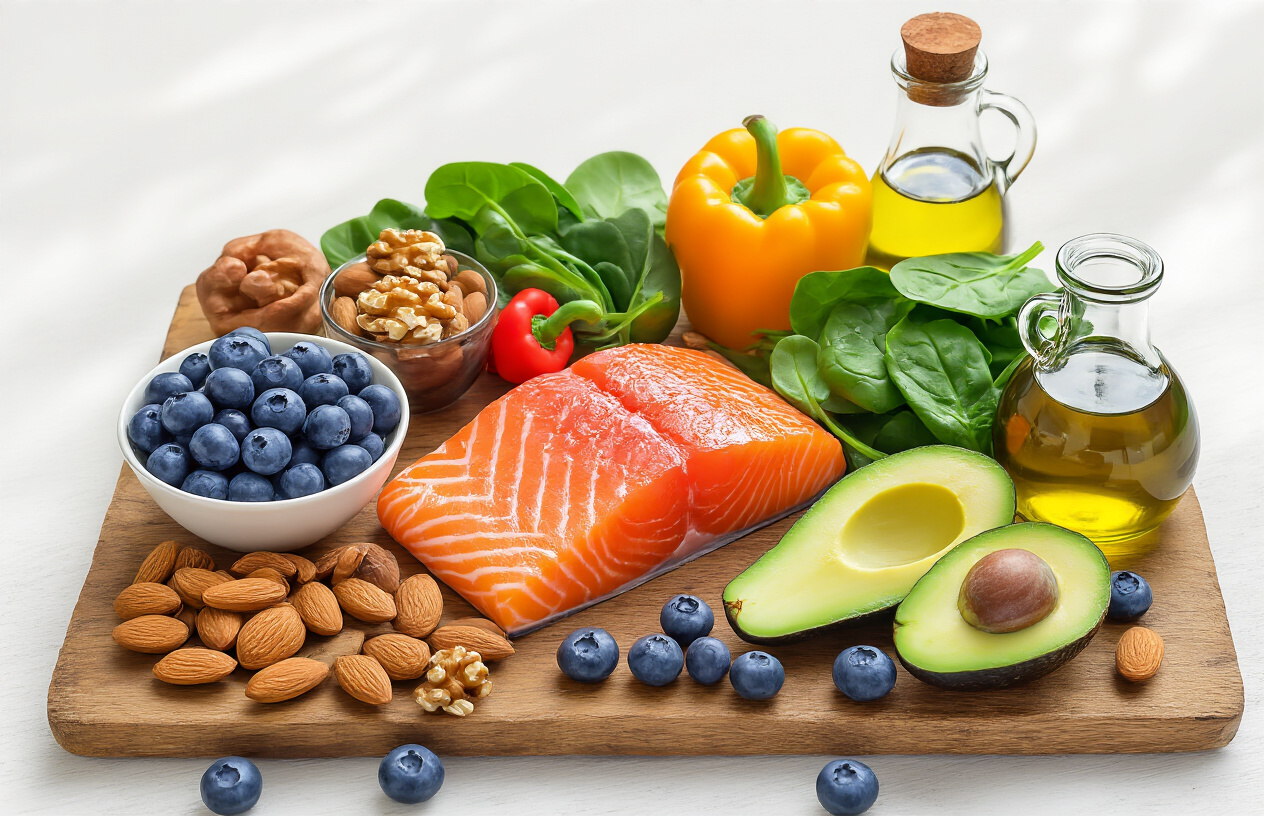Your brain needs the right fuel to stay sharp, focused, and healthy throughout your life. The foods you eat directly impact your cognitive function, memory, and mental clarity.
This guide is perfect for anyone wanting to boost their brainpower naturally – busy professionals seeking better focus, students preparing for exams, or adults looking to protect their long-term brain health.
We’ll explore essential brain-boosting vegetables that pack powerful nutrients for cognitive protection. You’ll also discover omega-3 rich foods that enhance memory function and learn about antioxidant-rich berries that can delay mental decline by years. Plus, we’ll cover the best brain-stimulating beverages and nuts that provide healthy fats your brain craves for optimal performance.
Essential Brain-Boosting Vegetables and Plant Foods

Green Leafy Vegetables for Cognitive Protection
Leafy green vegetables stand as nutritional powerhouses for brain health, offering essential compounds that actively protect cognitive function. Kale, spinach, collards, and broccoli emerge as the top performers in this category, each packed with a unique combination of brain-healthy nutrients that work synergistically to support mental acuity.
These vegetables are particularly rich in vitamin K, a crucial nutrient that plays a vital role in cognitive protection. Vitamin K helps maintain brain cell integrity and supports proper neural communication pathways. Additionally, these greens contain high concentrations of lutein, a powerful antioxidant that crosses the blood-brain barrier to provide direct protection to brain tissue.
Folate, another key nutrient found abundantly in leafy greens, supports neurotransmitter production and helps maintain healthy brain function. Beta carotene, the precursor to vitamin A, contributes to cellular protection and helps reduce oxidative stress that can damage brain cells over time.
Plant-Based Nutrients That Slow Mental Decline
Research demonstrates that plant-based foods play a significant role in slowing cognitive decline, making them essential components of a brain-healthy diet. The combination of nutrients found in vegetables creates a protective effect that helps preserve memory and cognitive function as we age.
The antioxidant properties of these plant compounds work to neutralize free radicals that can cause cellular damage in the brain. This protective mechanism is particularly important for maintaining cognitive health over the long term, as oxidative stress is a major contributor to age-related mental decline.
Incorporating More Vegetables into Your Daily Diet
Following a healthy dietary pattern that includes abundant fruits and vegetables represents an important strategy for maintaining optimal brain health. The key to success lies in making vegetables a consistent part of your daily meals rather than treating them as occasional additions.
To maximize the cognitive benefits, aim to include a variety of leafy greens and other vegetables throughout your day. This approach ensures you receive a full spectrum of brain-protective nutrients while establishing sustainable eating habits that support long-term cognitive wellness.
Omega-3 Rich Foods for Enhanced Memory Function

Fatty Fish That Lower Alzheimer’s Risk
Fatty fish stand out as exceptional sources of omega-3 fatty acids, which are healthy unsaturated fats that play a crucial role in brain protection. These marine proteins contain significant concentrations of omega-3s that have been scientifically linked to lower blood levels of beta-amyloid, a harmful protein strongly associated with Alzheimer’s disease development. The brain benefits from these omega-3 fatty acids by maintaining neural membrane integrity and supporting cognitive function.
The connection between fatty fish consumption and reduced Alzheimer’s risk stems from omega-3s’ ability to combat neuroinflammation and protect brain cells from oxidative damage. Regular consumption of these fish helps maintain optimal brain health by providing the essential fatty acids that our bodies cannot produce independently.
Plant-Based Omega-3 Alternatives for Non-Fish Eaters
For individuals who do not consume fish, terrestrial omega-3 sources provide viable alternatives to support brain health. Flaxseeds represent one of the richest plant-based sources of omega-3 fatty acids, particularly alpha-linolenic acid (ALA), which the body can partially convert to the more bioavailable forms found in fish.
Avocados offer another excellent plant-based option, providing healthy fats that support brain function while delivering additional nutrients beneficial for cognitive health. Walnuts also serve as a powerful omega-3 source, containing significant amounts of ALA that contribute to enhanced memory function.
For those following plant-based diets or unable to obtain sufficient omega-3s through food sources alone, omega-3 supplements can be considered. However, it’s essential to consult with a healthcare professional before beginning any supplementation regimen to ensure appropriate dosing and avoid potential interactions with existing medications.
Recommended Serving Sizes and Mercury-Safe Options
To maximize brain benefits while minimizing health risks, it is recommended to consume fish at least twice per week. This frequency provides optimal omega-3 intake without excessive mercury exposure, which can counteract the cognitive benefits of fish consumption.
When selecting fish for brain health, prioritize low-mercury varieties that offer maximum safety alongside their omega-3 benefits. Salmon stands as an excellent choice, providing abundant omega-3s with relatively low mercury levels. Cod represents another safe option, offering lean protein and beneficial fatty acids without significant mercury concerns.
Canned light tuna provides a convenient and affordable omega-3 source, though it should be consumed in moderation due to moderate mercury content. Pollack rounds out the list of recommended options, delivering substantial brain-boosting nutrients while maintaining low mercury levels that make it safe for regular consumption.
Antioxidant-Rich Berries for Memory Enhancement

Flavonoids That Boost Cognitive Performance
Flavonoids represent a fascinating class of natural plant pigments that serve a dual purpose in berries – creating their vibrant, eye-catching colors while simultaneously delivering powerful brain-boosting benefits. These remarkable compounds are the secret behind berries’ ability to enhance memory function and support overall cognitive health. When you consume berries rich in flavonoids, you’re essentially providing your brain with specialized nutrients that have been scientifically proven to improve memory performance.
The mechanism by which flavonoids enhance cognitive function involves their interaction with neural pathways responsible for memory formation and retention. These natural compounds work at the cellular level to support brain health, making them an essential component of any brain-nourishing diet. The brilliant hues you see in blueberries, strawberries, and other berries are visual indicators of their flavonoid content – the more vibrant the color, the higher the concentration of these beneficial compounds.
Specific Berries That Delay Memory Decline
Research has identified specific berries that demonstrate remarkable effectiveness in delaying memory decline. A groundbreaking study revealed that women who incorporated two or more servings of strawberries and blueberries into their weekly diet experienced significant cognitive benefits. These particular berries showed the ability to delay memory decline by up to two-and-a-half years, representing a substantial improvement in cognitive longevity.
Strawberries and blueberries stand out as the most studied and proven berries for brain health enhancement. The research findings specifically highlight these two varieties as having measurable impact on memory preservation. This delay in memory decline represents a significant advancement in understanding how dietary choices can influence cognitive aging, making these berries essential additions to any brain-healthy eating plan.
Optimal Berry Consumption for Brain Benefits
The research provides clear guidance on optimal berry consumption patterns for maximum brain benefits. Consuming two or more servings of strawberries and blueberries each week represents the threshold for achieving measurable memory enhancement benefits. This consumption pattern proved effective in the study, demonstrating that consistent, regular intake rather than sporadic consumption delivers the most significant cognitive advantages.
This weekly consumption recommendation offers a practical and achievable approach to incorporating brain-boosting berries into your regular diet. The fact that just two servings per week can produce such dramatic results – delaying memory decline by up to two-and-a-half years – makes this an accessible strategy for anyone looking to protect and enhance their cognitive function through nutrition.
Brain-Stimulating Beverages for Mental Clarity

Coffee and Tea for Improved Focus
Coffee and tea stand as two of the most widely consumed beverages that can significantly enhance mental performance. The caffeine content in these beverages provides more than just a temporary energy boost – it delivers substantial cognitive benefits that extend well beyond the initial consumption period. Regular coffee and tea drinkers often experience improved concentration, heightened alertness, and enhanced mental acuity that can last for hours after consumption.
Studies consistently demonstrate that individuals with higher caffeine consumption perform notably better on comprehensive tests of mental function. This improvement spans various cognitive domains, including attention span, processing speed, and overall brain performance. The sustained nature of these benefits makes coffee and tea particularly valuable for individuals requiring extended periods of mental focus and clarity.
Caffeine’s Role in Memory Consolidation
Beyond immediate focus enhancement, caffeine plays a crucial role in strengthening and preserving memories. Research reveals that caffeine consumption can significantly improve the brain’s ability to solidify new memories, transforming short-term information into long-term storage more effectively.
A compelling study demonstrated caffeine’s memory-enhancing properties by showing that participants who consumed caffeine were substantially more successful at correctly identifying images the following day compared to those who did not consume caffeine. This finding suggests that caffeine not only helps with immediate recall but also strengthens the neurological processes responsible for memory consolidation during sleep and rest periods.
The mechanism behind this memory enhancement appears to involve caffeine’s ability to influence the brain’s natural memory formation processes, making newly acquired information more likely to be retained and recalled accurately over time.
Daily Consumption Guidelines for Cognitive Benefits
To maximize the brain-boosting benefits of caffeinated beverages while maintaining optimal health, understanding proper consumption patterns is essential. The cognitive advantages of coffee and tea are most pronounced when consumed consistently but within reasonable limits that support rather than overwhelm the nervous system.
Regular, moderate consumption appears to be the key to unlocking sustained cognitive benefits. This approach allows the brain to adapt to caffeine’s presence while maintaining sensitivity to its positive effects on mental function and memory consolidation. The timing of consumption also plays a vital role, with strategic intake supporting natural circadian rhythms and cognitive peak performance periods.
Nuts and Healthy Fats for Brain Health

Walnuts as Superior Memory Enhancers
Walnuts stand out among nuts as exceptional brain-nourishing foods, offering unique cognitive benefits that make them true memory enhancers. These tree nuts are excellent sources of protein and healthy fats, with their consumption directly linked to improved cognitive test scores in research studies. The distinctive nutritional profile of walnuts makes them particularly valuable for brain health, as they provide the essential building blocks your brain needs to function optimally.
What sets walnuts apart is their exceptionally high content of alpha-linolenic acid (ALA), a specific type of omega-3 fatty acid that plays a crucial role in brain function. This plant-based omega-3 fatty acid serves as a precursor to other important omega-3s that the brain requires for maintaining neural health and supporting memory formation. Regular walnut consumption provides your brain with a steady supply of these critical nutrients, contributing to enhanced cognitive performance over time.
Healthy Fats That Protect Brain Arteries
Now that we have covered the specific benefits of walnuts, it’s important to understand how healthy fats in general protect your brain’s vascular system. Diets rich in ALA and other omega-3 fatty acids have been consistently linked to lower blood pressure and cleaner arteries, creating a dual benefit that supports both heart and brain health simultaneously.
The connection between arterial health and brain function cannot be overstated. When your arteries remain clean and flexible, blood flow to the brain improves, ensuring that this vital organ receives the oxygen and nutrients it needs to perform at its peak. The omega-3 fatty acids found in walnuts and other healthy fat sources help maintain arterial integrity, reducing inflammation and preventing the buildup of harmful deposits that can impair circulation.
Choosing healthy fats such as olive oil or canola oil, rather than saturated fats, represents a fundamental dietary strategy for brain protection. These healthier fat options support the same arterial benefits while providing the brain with the energy it needs for optimal cognitive function.
Plant Proteins That Support Cognitive Function
With this understanding of healthy fats in mind, the protein content in walnuts and similar plant-based sources provides additional cognitive support. The combination of high-quality plant proteins with beneficial fats creates a synergistic effect that enhances overall brain health. These proteins supply the amino acids necessary for neurotransmitter production, which are essential for memory formation, focus, and mental clarity.
The protein found in walnuts works alongside the omega-3 fatty acids to support cognitive test performance, demonstrating how multiple nutrients can work together to optimize brain function. This nutritional synergy makes nuts like walnuts particularly valuable additions to a brain-healthy diet.

Nourishing your brain doesn’t require a magic pill or single superfood. The most effective approach combines the essential brain-boosting vegetables, omega-3 rich foods, antioxidant-packed berries, mental clarity beverages, and healthy nuts and fats we’ve explored. These foods work together as part of a comprehensive dietary pattern that supports both your brain and cardiovascular health.
The foods that protect your heart are the same ones that safeguard your cognitive function. By incorporating leafy greens, fatty fish, berries, tea or coffee, and walnuts into your regular meals, you’re creating a foundation for long-term brain health. Start small by adding one or two of these brain-nourishing foods to your daily routine, and gradually build a dietary pattern that will support sharp thinking and memory for years to come.









